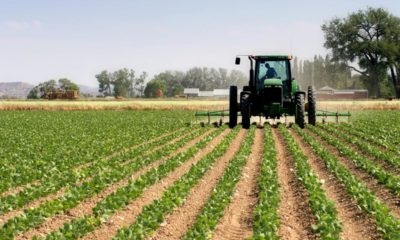A new focus report, produced by Oxford Business Group (OBG) in partnership with Farmforte, maps out Nigeria’s plans to boost agriculture’s contribution to the economy through innovation and development finance.
Titled “The Report: Nigeria 2022, Agriculture“, the study looks at the key role earmarked for agri-tech in supporting the country’s efforts to ensure food security for its growing population and create a more diversified, industrialised economic base.
It highlights the growing number of investment and partnership opportunities emerging in areas that include finance, logistics and infrastructure development, as Nigeria moves to strengthen its agricultural value chain and drive sectoral expansion.
The report also analyses the local value-added activities that are ripe for growth and will help Nigeria meet domestic demand, while also paving the way for it to increase export revenue over time, which range from agro-processing to food and beverage manufacturing.
The African Continental Free Trade Area (AfCFTA) and the considerable potential it offers Nigeria to develop intra-continental agricultural trade in the coming years is another focus.
Subscribers will also find coverage of the challenges that producers currently face, which range from insufficient levels of irrigation and land tenure issues to limited implementation of research findings.
The report includes interviews with key industry representatives, including Osazuwa Osayi, Co-founder and Co-CEO, Farmforte, the Lagos-based, impact-oriented value chain development firm.
In the interview, Osayi shares his views on a range of topical issues, including what could be done to support small and medium-sized agricultural enterprises, which are seen as a vehicle for sustainable economic development and employment generation.
“During the Covid-19 pandemic farmers reduced market-oriented vegetable production, produced more vegetables for their own consumption, increased home processing and storage, explored new markets and accepted lower sales prices,” he said. “Socio-economic factors such as age, household size and marital status, as well as difficulty accessing inputs and perceptions of the effects of the pandemic, influenced farmers’ decisions to adopt particular coping strategies. With this in mind, in order to sustain vegetable supplies, policymakers should consider investing more in market-oriented strategies such as vegetable processing and storage, which individual farmers may not be able to afford due to high costs, as well as a lack of information and knowledge on good agronomic practices, post-harvest handling facilities, storage and market access.”
Karine Loehman, OBG’s Managing Director for Africa, said that although Nigeria’s agriculture sector displayed resilience during 2020-21, the Covid-19 crisis had heightened the issues surrounding food security in Nigeria, with supply-chain disruptions, limited transport, reductions in income and difficulty accessing credit just some of the issues faced across the sector.
“The pandemic has sharpened the focus on agri-tech, highlighting its benefits, especially for smallholder farmers and small agricultural enterprises, and accelerating the adoption of tech-led solutions,” she said. “Our report shows that there is widespread recognition of the part that agrarian activities could play in supporting Nigeria’s bid to reduce its reliance on oil and a will to return agriculture to its role of key contributor to economic growth.”
The report on Nigeria’s agriculture sector forms part of a series of tailored studies that OBG is currently producing with its partners, alongside other highly relevant, go-to research tools, including a range of country-specific Growth and Recovery Outlook articles and interviews.

 Naira4 weeks ago
Naira4 weeks ago


 Naira4 weeks ago
Naira4 weeks ago




 Naira4 weeks ago
Naira4 weeks ago




 Naira3 weeks ago
Naira3 weeks ago


 News4 weeks ago
News4 weeks ago
 Travel4 weeks ago
Travel4 weeks ago




 Naira3 weeks ago
Naira3 weeks ago


 Jobs3 weeks ago
Jobs3 weeks ago

















